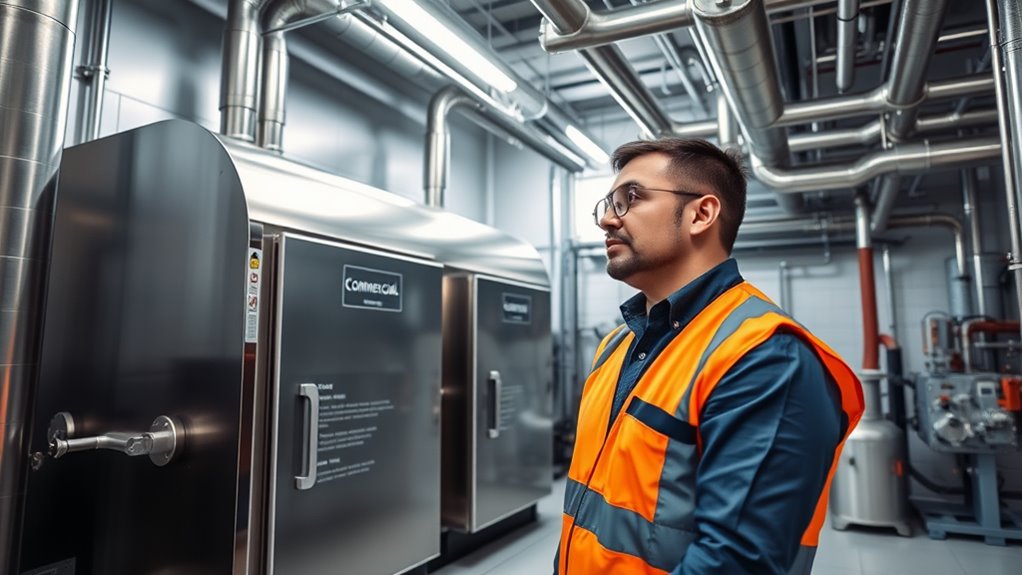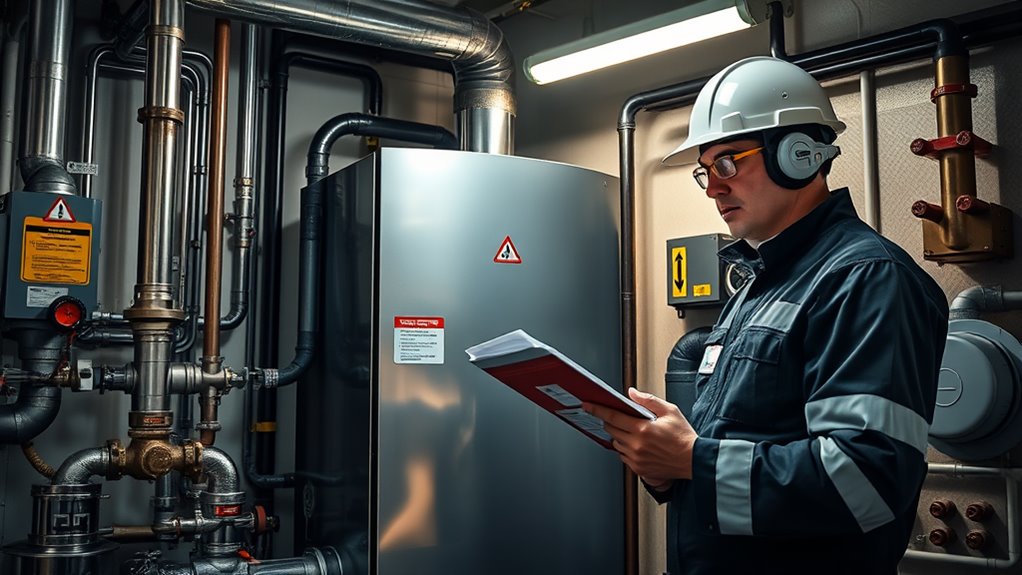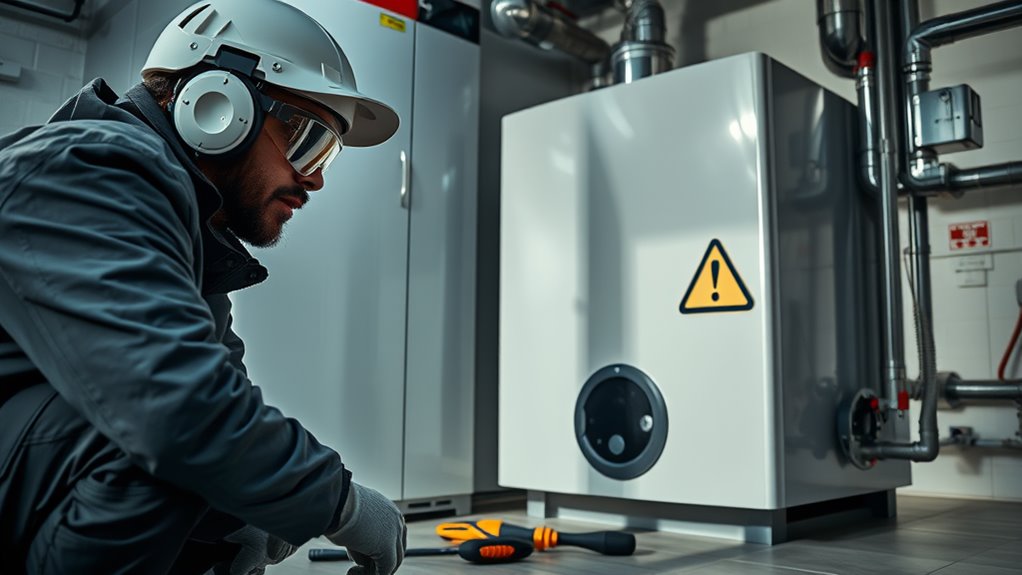You can't work on a domestic boiler in a commercial property. These boilers are designed for smaller spaces and lower heating demands, while commercial boilers meet higher capacity and efficiency standards. Working on a domestic boiler in such settings could lead to regulatory violations and safety risks. You'll need to guarantee compliance with local laws and seek professional help if necessary. Learn about the key differences and other considerations to guarantee safe and effective boiler management.
Key insights
- Working on a domestic boiler in a commercial property may not meet efficiency standards required for commercial applications.
- Domestic boilers typically lack the capacity to handle high workloads common in commercial settings, risking inefficiencies.
- Compliance with local regulations is essential; domestic boilers may not be approved for commercial use without proper certification.
- Employing a Gas Safe registered engineer is mandatory for any boiler work, regardless of the property type.
- Regular maintenance and inspections are legally required for commercial boilers, which may not apply to domestic installations in that setting.
Understanding Domestic Boilers and Their Applications

When you consider the role of domestic boilers in a commercial property, it's vital to understand their specific functions and applications. Domestic boilers primarily provide heating and hot water, but their efficiency and heating capacity can greatly influence overall energy use. You'll want to assess boiler efficiency to guarantee peak performance; higher efficiency means lower operational costs and reduced environmental impact. The heating capacity must align with the property's demands to avoid inadequate heating or excessive energy consumption. It's important to evaluate these factors carefully, as they determine the boiler's suitability in a commercial setting. Properly integrating a domestic boiler can enhance energy efficiency and maintain comfort levels, making it a strategic choice for various applications. Regular servicing ensures safe and efficient operation, which is crucial when using a domestic boiler in a commercial environment.
The Distinction Between Domestic and Commercial Boilers

Understanding the distinction between domestic and commercial boilers is essential for compliance and efficiency. You'll find that boiler types vary markedly in capacity, design, and intended use, impacting their performance in different settings. Additionally, regulations and standards differ, necessitating careful consideration when working on these systems in a commercial property. Compliance with local building regulations is crucial to ensure safety and avoid operational disruptions.
Boiler Types Comparison
While both domestic and commercial boilers serve the essential function of heating water and providing warmth, they differ considerably in design, capacity, and application. Domestic boilers typically have a lower heating capacity, designed for smaller spaces and households. Their boiler efficiency often focuses on providing adequate heat for everyday use without excessive energy consumption. In contrast, commercial boilers are built for larger facilities, featuring notably higher heating capacities to meet the demands of numerous occupants or processes. These boilers prioritize efficiency at scale, often incorporating advanced technology to optimize performance and reduce operational costs. Understanding these differences is vital when considering installations or maintenance, as the wrong type can lead to inefficiencies and increased expenses. Additionally, the installation of energy-efficient heating systems is crucial for reducing operational costs and supporting sustainability goals in commercial settings.
Regulations and Standards
Regulations and standards for boilers differ markedly between domestic and commercial applications, primarily due to the scale and complexity of their operations. When working on a domestic boiler in a commercial property, you must guarantee regulatory compliance with specific industry standards that govern such installations. Here are three essential points to take into account:
- Capacity and Efficiency: Commercial boilers typically have higher capacity requirements and efficiency standards than domestic models.
- Installation Requirements: Commercial settings often necessitate more stringent installation protocols, including safety measures and ventilation factors.
- Maintenance Protocols: Regular maintenance for commercial boilers is mandated more rigorously, often requiring certified professionals to confirm compliance with local regulations. Additionally, obtaining a Commercial Gas Safety Certificate is crucial for validating that all gas systems meet safety standards.
Understanding these distinctions is vital for guaranteeing safe and legal operations in a commercial environment.
Relevant Regulations and Standards

When working on a domestic boiler in a commercial property, it is vital to comply with the relevant regulations and standards that govern installation, maintenance, and safety. Regulatory compliance is significant to guarantee that your work meets legal obligations and protects the wellbeing of occupants. Familiarize yourself with the Gas Safety (Installation and Use) Regulations, which dictate safe installation practices. Additionally, adhere to the Building Regulations and relevant industry standards, such as those set by the Institute of Gas Engineers and Managers (IGEM) and the British Standards (BS). These guidelines not only enhance safety but also contribute to operational efficiency. By following these regulations, you make certain that your work is both compliant and up to the industry's best practices, minimizing risks associated with boiler operation. Regular inspections and preventative maintenance are also crucial for ensuring the longevity and safety of the boiler systems in commercial settings.
Safety Considerations When Working on Domestic Boilers

When working on domestic boilers, it's vital to adhere to equipment safety standards to guarantee proper functionality and reduce risks. Always wear appropriate personal protective gear to safeguard yourself from potential hazards. Additionally, familiarize yourself with gas safety regulations to prevent dangerous leaks or explosions during maintenance. Regular maintenance and servicing can also help prevent boiler errors and ensure optimal performance.
Equipment Safety Standards
Ensuring compliance with equipment safety standards is essential for anyone working on domestic boilers, as it not only protects the technician but also safeguards the property and its occupants. To maintain these standards, you should focus on the following key aspects:
- Equipment Testing: Regularly perform thorough testing of all boiler components to confirm they function correctly and safely.
- Safety Certifications: Verify that your equipment has the necessary safety certifications, ensuring it meets industry regulations and standards.
- Maintenance Records: Keep detailed records of all maintenance and inspections, helping to track compliance and identify any recurring issues. Additionally, understand the importance of E119 error codes, as they can indicate significant pressure-related issues that need immediate attention.
Personal Protective Gear
While working on domestic boilers, wearing appropriate personal protective gear (PPE) is vital to minimize risks and guarantee your safety. Start with protective clothing, such as coveralls, which shield you from burns and chemical exposure. Use gloves designed for heat resistance and prevent cuts and scrapes while handling equipment. Safety goggles are essential for eye protection against debris and splashes. Steel-toed boots provide foot protection from heavy equipment and sharp objects. Additionally, consider a hard hat if you're in an area where overhead hazards exist. Don't forget to wear hearing protection in noisy environments. By prioritizing personal safety through appropriate PPE, you greatly reduce the chances of injury and guarantee a safer work environment when servicing domestic boilers. Furthermore, ensuring proper system efficiency through regular maintenance can significantly reduce risks associated with boiler operation.
Gas Safety Regulations
Gas safety regulations are essential for anyone working on domestic boilers, as they help prevent hazardous situations that could lead to leaks, explosions, or carbon monoxide poisoning. To verify gas appliance safety and maintain regulatory compliance, follow these key guidelines:
- Certification: Always work with a Gas Safe registered engineer to guarantee proper installation and maintenance.
- Regular Inspections: Schedule routine checks to identify any potential issues, verifying the system operates safely and efficiently.
- Ventilation: Verify adequate ventilation in the area surrounding the boiler to prevent dangerous gas build-up. Additionally, conduct routine inspections focusing on the heat exchanger and pressure valves to ensure optimal performance.
Licensing and Certification Requirements

Before starting work on a domestic boiler in a commercial property, it is crucial to understand the licensing and certification requirements that apply. You'll need to verify you have the appropriate licenses, as most jurisdictions mandate specific licensing requirements for individuals working with boilers in commercial settings. This often includes holding a gas safe registration or a similar certification specific to your area. Additionally, familiarize yourself with the certification processes required to maintain your qualifications. These processes frequently involve formal training and assessments to demonstrate your competence. Without the necessary licenses and certifications, not only could your work be legally questionable, but it might also pose safety risks. Always verify your credentials to confirm compliance with local regulations. Regular preventative maintenance tips can further ensure the safe operation of the boiler.
Assessing the Suitability of Domestic Boilers in Commercial Settings
How do you determine whether a domestic boiler is suitable for a commercial setting? It's crucial to assess several factors before making a decision. Here are three key considerations:
- Boiler Efficiency: Check the efficiency rating of the domestic boiler. It should meet or exceed industry standards for commercial use to guarantee peak performance.
- Energy Consumption: Analyze the boiler's energy consumption against the demands of the commercial property. A domestic boiler may not handle high workloads effectively.
- Output Capacity: Evaluate the boiler's output capacity. Compare it to the heating and hot water requirements of the commercial space, as insufficient capacity could lead to inefficient operation.
Maintenance Best Practices for Domestic Boilers
While maintaining a domestic boiler might seem straightforward, adhering to best practices is crucial for guaranteeing peak performance and longevity. First, schedule regular boiler maintenance checks at least once a year. During these inspections, a qualified technician should assess components, check for leaks, and clean essential parts to enhance energy efficiency. You should also monitor pressure levels and confirm the expansion vessel is functioning correctly. Regularly bleed radiators to eliminate trapped air, which can impede efficiency. Remember to inspect and replace the boiler's filters as needed to prevent clogs. Additionally, keep the area around the boiler clear of obstructions to maintain airflow. By following these maintenance practices, you'll help your domestic boiler operate efficiently and reliably.
Potential Risks and Legal Implications
When working on a domestic boiler in a commercial property, understanding the potential risks and legal implications is essential to guarantee compliance and safety. Failing to conduct a thorough risk assessment can lead to serious consequences, including:
- Increased Liability Issues: If something goes wrong, you may be held responsible for damages or injuries.
- Regulatory Non-Compliance: Not adhering to local regulations can result in fines or legal action against you or your employer.
- Operational Disruptions: Boiler failures can lead to costly downtime, affecting business operations.
Alternatives to Domestic Boilers in Commercial Properties
Weighing the potential risks and legal implications of working with domestic boilers in commercial settings, exploring alternatives becomes a practical necessity. One effective option is to implement commercial-grade boilers designed specifically for larger spaces. These units often provide enhanced energy efficiency, lowering operational costs and reducing environmental impact. Another alternative is to evaluate alternative heating methods, such as heat pumps or radiant floor heating systems. Heat pumps use electricity to transfer heat, making them an eco-friendly choice. Additionally, integrating smart thermostats can optimize energy use and improve efficiency. By choosing these alternatives, you not only guarantee compliance with regulations but also enhance the overall performance of your heating system, ultimately benefiting your business's bottom line.
Frequently Asked Questions
Can Domestic Boilers Be Installed in Commercial Kitchens?
Yes, you can install domestic boilers in commercial kitchens, but you'll need to meet specific domestic boiler regulations and commercial kitchen requirements. Verify the boiler is suitable for the kitchen's demands and complies with safety standards. It's essential to consult local codes and possibly seek approval from relevant authorities to avoid potential issues. Always prioritize efficiency and safety to maintain a productive kitchen environment while adhering to the necessary regulations.
What Are the Costs Involved in Retrofitting a Domestic Boiler?
When retrofitting a domestic boiler, you'll need to conduct a thorough cost analysis. Installation challenges may arise, such as guaranteeing compatibility with existing systems and meeting local regulations. Typical costs include the boiler itself, labor for installation, and any necessary modifications to plumbing or electrical systems. You should also factor in potential ongoing maintenance expenses. Overall, budgeting carefully will help you navigate the complexities and guarantee a successful retrofit.
Do Domestic Boilers Require Different Insurance in Commercial Properties?
When dealing with domestic boilers in commercial properties, you need to take into account insurance coverage. Commercial insurance policies often differ from residential ones, as they typically cover higher risks associated with business operations. You might find that your existing policy doesn't adequately cover a domestic boiler's specific needs in a commercial setting. It's essential to review policy differences and guarantee your insurance meets the requirements for both safety and compliance. Always consult an insurance professional for guidance.
How Often Should Domestic Boilers Be Serviced in Commercial Settings?
You should service domestic boilers in commercial settings at least once a year to guarantee compliance with commercial heating regulations. This boiler maintenance frequency helps prevent breakdowns and guarantees efficient operation. However, if the boiler experiences heavy use or operates in a demanding environment, consider increasing the frequency to biannual services. Regular maintenance not only extends the boiler's lifespan but also enhances safety and efficiency, aligning with industry standards and regulations.
Can I Use a Domestic Boiler for Heating Multiple Commercial Units?
You can't effectively use a domestic boiler for heating multiple commercial units due to domestic boiler limitations. These boilers are designed for smaller residential spaces and typically lack the capacity to meet commercial heating requirements. They might not provide sufficient output or efficiency for larger units, leading to potential overheating or inadequate heating. For your commercial needs, consider investing in a proper commercial boiler that meets your specific heating demands efficiently and safely.
Summary
In summary, while it might be tempting to use a domestic boiler in a commercial property, you need to take into account the regulations, safety standards, and potential risks involved. Make sure you assess the suitability of the boiler for the commercial setting and comply with licensing requirements. It's often more prudent to opt for commercial-grade boilers designed for larger demands. Always prioritize safety and legality to avoid complications down the line.

